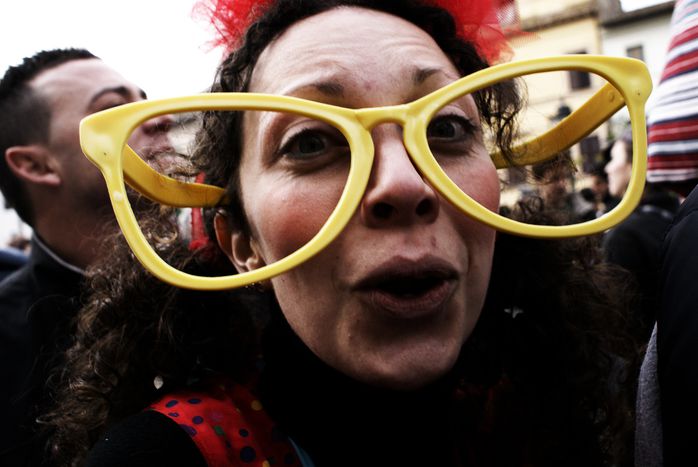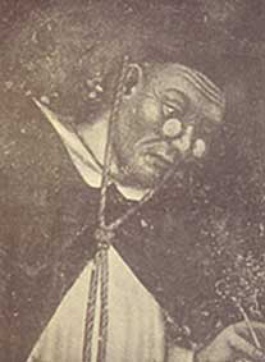
FROM “FOUR-EYES” TO GOOGLE GLASS: THE EPIC JOURNEY OF GLASSES AND THEIR WEARERS
Published on
Translation by:
 Morwenna Kotz
Morwenna Kotz
In 2014, Google will launch its eponymous Google Glass, the lightweight lenses that will allow us to surf the net literally at a glance. Whether they will revolutionize our lives or not, one thing is for sure: from Medieval times up to the 21st century, glasses themselves may not have changed but those who wear them most definitely have.
We’re all acquainted with the cinematographic trope associated with the 'nerd', who falls to the ground under the blows of the on-duty bully. They are the accessory that best represents the sad fate of these playground weaklings. Not the giant rucksack or the colourful socks that protrude from the tops of their All Stars. We are talking about glasses - the very same ones that, falling to the ground along with their inauspicious owner, bounce along the rough asphalt before bully number one bounds over to smash them into pieces.
NOT SO SEXY
Mistreated from the early years of school, they are the symbol of the teachers’ pet who sits in the front row and receives constant praise from the teachers. How can we forget those poor souls branded ‘four eyes’ for the lenses so thick that they seemed to duplicate the number of their pupils? What about all those girls who turn up to prom wearing just the right thing – apart from the wire frames fixed firmly to their eager, soon-to-be-disappointed faces? These were the nineties and with the end of the millennium just around the corner one thing seemed certain: glasses would forever remain an indelible mark of the not-so-sexy.
Yet, as we made our way through the first year of the noughties, there arrived one of the first novelties of the century: in the blink of an eye the ignoble accessory was replaced (as we thought back then…) once and for all by contact lenses. The trend spread even among the youngest generations and glasses were barely able to grace the shadows of the schoolyard with their presence. There were even those who would change their eye colour wearing those devilish disposable lenses… without risking being accused of imitating Lady Gaga.
REVENGE OF THE NERDS
It’s unclear whether the cause of this phenomenon can be ascribed to the crisis (the identity one, not the other one) or to the old idea ‘we were better off when we were worse off,’ but after 2010 the trend became inverted – almost directly mirroring the Restoration at the beginning of the 18th century. Glasses were transformed from the symbol of the loser to that of the cool kid. Who could have predicted that?
Now, as we embrace the phenomenon of the hipster, it’s all about the frames - that only really count if they are at least as thick as your Gran’s. This trend is so all-encompassing that there are many who must stoop to buying frame-only glasses, cursing fate that they were born without sight defects. Of course, there are still some who prefer contact lenses, but this trend has most definitely created a niche in the market and represents a fashion statement that is supported, whether consciously or not, by actors and artists the world over.
COMING FULL CIRCLE
Celebs aside, it is in no way a coincidence that the ‘professor look’, associated with these oft-adapted accessories, is storming its way back into the fashion world. Glasses were created as scholarly, erudite objects, used by those Medieval legends who were able to manipulate the fields of human knowledge with each stroke of their quill.
The story of the original diffusion of glasses by monks and merchants travelling between Venice, Pisa and Florence is today only a couple of clicks away thanks to good old Google. And perhaps, as we return to modernity and Google’s Mountain View HQ, this story is going to come full circle.
 The mysterious accessory currently known as Google Glass (the ultra lightweight, digital glasses) perhaps represents the next inversion of the trend - with the agreement of the hipster community, whose exit from the ‘scene’ is envisaged for 2014. Representing the final stage of a project that was dreamt up in the Boston labs of MIT back in 1998, these glasses will allow us to surf the web without using our hands, to stream everything we are seeing online and to become synapses of the internet ourselves, in place of our smartphones. On the one hand, we seem to have reached a point of no return and yet, at the same time, there is a trend that will always remain: we may never again be the classroom ‘specky four eyes,’ or the girl groping helplessly on the ground for her glasses, but even with Google Glass, the only change is that we might be slightly cooler than before.
The mysterious accessory currently known as Google Glass (the ultra lightweight, digital glasses) perhaps represents the next inversion of the trend - with the agreement of the hipster community, whose exit from the ‘scene’ is envisaged for 2014. Representing the final stage of a project that was dreamt up in the Boston labs of MIT back in 1998, these glasses will allow us to surf the web without using our hands, to stream everything we are seeing online and to become synapses of the internet ourselves, in place of our smartphones. On the one hand, we seem to have reached a point of no return and yet, at the same time, there is a trend that will always remain: we may never again be the classroom ‘specky four eyes,’ or the girl groping helplessly on the ground for her glasses, but even with Google Glass, the only change is that we might be slightly cooler than before.
Translated from Da "quattr'occhi" ai Google Glass: l'odissea degli occhiali


